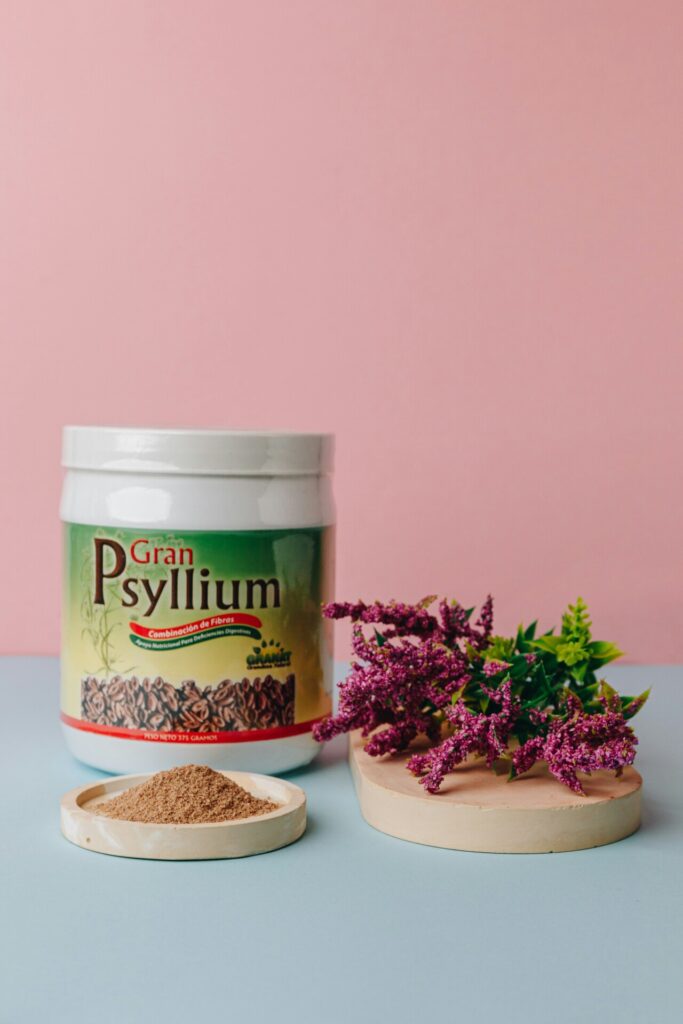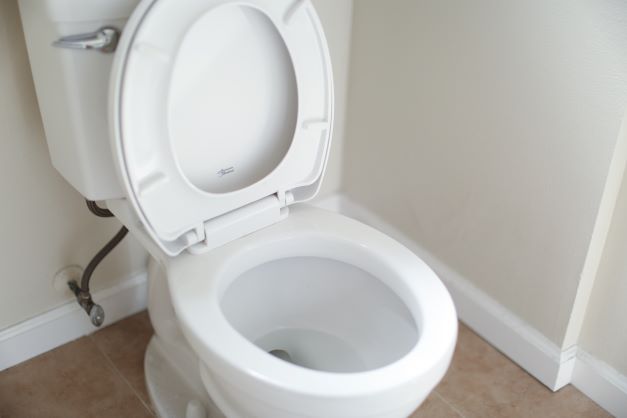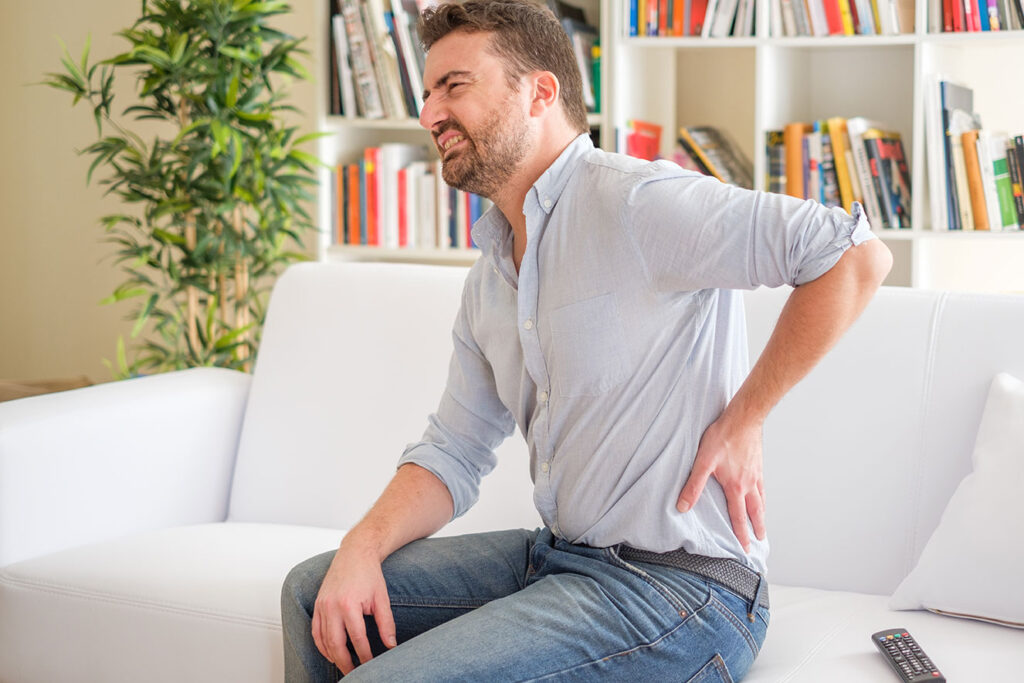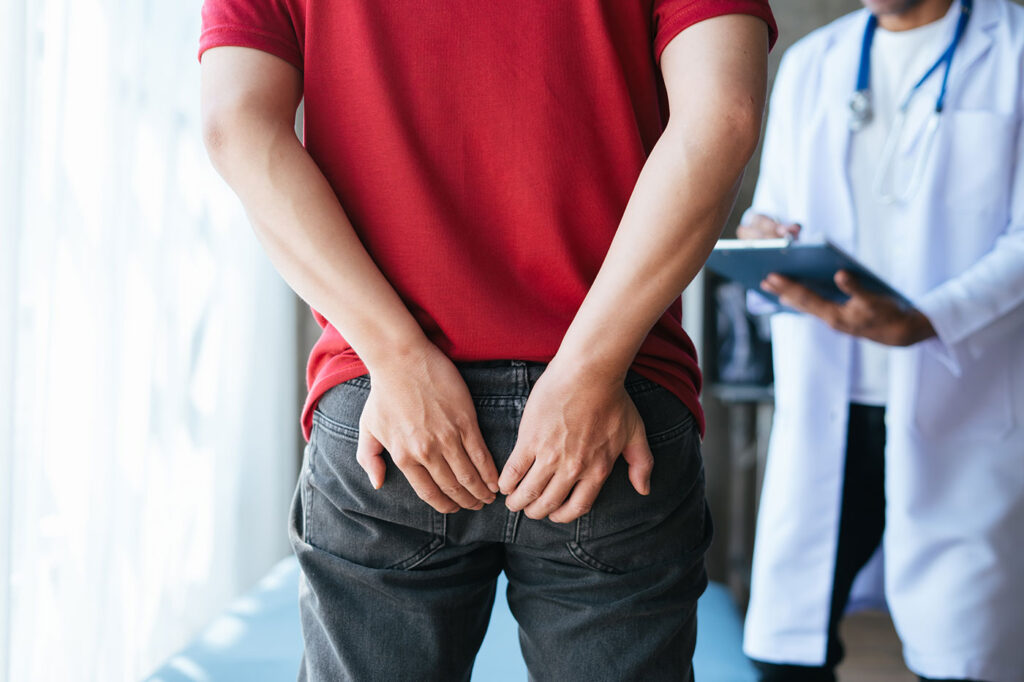Hemorrhoids (also known as piles) can form in the veins in and around the rectum when they come under pressure. Often, straining to pass a bowel movement is the source of that pressure. So, if you soften your stool, you might need to strain less. And that could take pressure off your rectum. But is it worth it to soften your stool with fiber supplements for hemorrhoids? In this post, we'll explore the benefits of added fiber in your diet.

Can Fiber Supplements Relieve Hemorrhoids?
Fiber supplements for hemorrhoids can help prevent hemorrhoids from forming. They reduce your constipation risk. But even if you already have piles, this study shows that fiber supplementation can provide a 50% reduction in the risk for hemorrhoid symptoms like rectal bleeding. Just be sure to maintain sufficient fluid intake while taking these supplements, or they might not work the way they are intended.
Finding the Best Supplement to Eliminate Hemorrhoids
Most people who begin taking a fiber supplement will turn to something like Metamucil (an OTC psyllium husk fiber product.) Sometimes, this kind of supplement leads to bloating and gas. And if that happens to you, you can look for Benefiber or other wheat dextrin supplements, since they may be easier to digest.
Can Fiber Supplements Shrink Hemorrhoids?
If you have mild, Grade 1 hemorrhoids, adding more fiber to your diet could help resolve your piles. But if you have grade 2, 3 or 4 hemorrhoids, added fiber is unlikely to shrink your swollen vessels. In such cases, you'll likely need a medical procedure to find relief.
How to Shrink Hemorrhoids the Fastest
Treating hemorrhoids with lifestyle measures such as fiber supplements can be a slow process. And grade 2, 3 or 4 hemorrhoids are unlikely to respond to these measures. Thus, if you want to find the fastest way to shrink hemorrhoids, and you wish to avoid surgery, we suggest exploring HAE (hemorrhoid artery embolization) at the Georgia Hemorrhoid Institute. For more information and to explore your candidacy, you can request your consultation today.
Patients with hemorrhoids may be told to change their diets. Why is that the case? Dietary changes can reduce constipation. And that could eliminate hemorrhoid risk factors such as straining and sitting for too long on the toilet. But what's the best diet to help hemorrhoids? Here's what you need to know.

Diet to Help Hemorrhoids: Embrace Fiber
A high-fiber diet can help manage hemorrhoid symptoms by giving you softer stools. But how much is enough? The Dietary Guidelines for Americans, 2020–2025, suggests getting 14 grams of fiber per day for every 1,000 calories consumed, meaning you should get at least 28 grams each day if you're following a 2,000-calorie diet. But what foods should you include in that diet? Try adding:
- Pears, prunes, apples and berries
- Squash, peas and collard greens
- Navy, pinto and/or kidney beans
- Whole grains such as shredded wheat and bran
Make sure to also drink lots of water every day, and get plenty of regular exercise. For some patients, these lifestyle changes will be sufficient to prevent or treat mild hemorrhoids. But others will need more help to find relief.
Foods to Skip in a Diet for Hemorrhoids
While you're upping your daily fiber intake, you can also avoid foods that may trigger constipation. Some of the worst offenders include low-fiber items such as:
Low-fiber foods to avoid:
- chips
- cheeses
- hot dogs
- fast food
- meat
- ice cream
- processed snacks
- frozen dinners
When to Ask for Help
Lifestyle changes work well when you're dealing with mild hemorrhoids. But if your condition is more severe, and you experience bleeding when you pass bowel movements, it's time to seek medical intervention.
So, if you don't find relief with a diet to help hemorrhoids, it's time to visit the Georgia Hemorrhoid Institute! Our experts perform hemorrhoid artery embolization, a minimally-invasive procedure that relieves hemorrhoids by reducing their blood supply. And, in the process, you can avoid overnight hospital stays, surgery, and many medical complications.Are you ready to discover if you are a candidate for hemorrhoid artery embolization? Click here to request an appointment.
If you notice blood in the toilet after you pass a bowel movement, or detect blood in your stool, you could have internal hemorrhoids, a condition also referred to as piles. However, rectal bleeding is also a symptom of certain cancers, as this 36-year-old father learned when he was diagnosed with colorectal cancer after assuming that the blood in his stool meant he had hemorrhoids. Clearly, diagnosing what's causing your rectal bleeding is critical for your health. In this post, we help you tell the difference between bleeding associated with hemorrhoids vs cancer.

Determing Cause of Blood in Toilet By Color
The color of the blood you notice after passing a bowel movement could help you figure out why you're bleeding in the first place. When blood in the toilet is simply one of your hemorrhoid symptoms, it will appear to be bright red, much like the color of fresh pizza sauce. But if your rectal bleeding is a sign or cancer, the blood could be much darker.
Now, bleeding isn't the only common symptom between piles and cancer. Both conditions can change your bowel habits and cause anal protrusions. And, while monitoring the color of your blood can provide your healthcare provider with useful information, you will still need to seek medical attention to receive an accurate diagnosis and an appropriate course of treatment.
Medical Procedure to Relieve Hemorrhoids
If hemorrhoids are what's causing you to notice blood in the toilet, you may find temporary relief with topical products. But once you've developed symptoms such as bleeding, you may need a medical procedure to enjoy lasting symptom relief. So, if you've been diagnosed with internal hemorrhoids, we invite you to visit us at the Georgia Hemorrhoid Institute. You can request a consultation here. Then, where see you in our Atlanta office, we can explore your candidacy for HAE (hemorrhoid artery embolization) a minimally-invasive treatment option for grades 1-3 internal hemorrhoids.

Why choose hemorrhoid embolization (often referred to as an emborrhoid technique) over other minimally invasive internal hemorrhoid treatments? And what are the other treatment options for your condition? This post shares all the important information.
What are hemorrhoids?
Hemorrhoids, those swollen veins in your anus or lower rectum, can take two forms: internal, meaning they've developed inside your rectum, and external, meaning they've developed outside its opening. While external hemorrhoids are typically more painful, internal hemorrhoids can also cause bleeding, itchiness and discomfort.
As a result, bleeding with bowel movements is the most common symptom for people with internal hemorrhoids. And that's why we see many patients at the Georgia Hemorrhoid Institute who have noticed blood in their stool.
Treating Hemorrhoids in Georgia: What are the Options?
There are several minimally invasive treatment options for internal hemorrhoids. Some involve lifestyle changes like following a diet to help hemorrhoids. You could also try topical or oral medication; or you may explore procedures such as sclerotherapy or a rubber band ligation. However, these options fail at least 10% of patients with internal hemorrhoids.
In the past, that meant having to schedule hemorrhoidectomy surgery to remove your swollen veins. However, as with any surgery, there were risks of complications. Luckily, there's now a better option available: hemorrhoid embolization.
Understanding Hemorrhoid Embolization
In the last 10 years, hemorrhoid embolization has emerged as an effective, minimally-invasive treatment option for internal hemorrhoids that have not progressed past stage 3. According to this review, it won't compromise anal tone, so you won't have to worry about side effects associated with surgery, such as anal incontinence. Also, HAE can preserve the surrounding tissue in your anus, and won't leave you with rectal wounds. Best of all, recovery is fairly quick: within three days of the procedure, most patients can resume their full activities. And HAE's minimally-invasive nature means you won't have to stay in the hospital overnight following your procedure.
This procedure is also proving to be highly effective, with an emerging success rate of close to 90%. In contrast, other hemorrhoid treatments are far less effective, some with recurrence rates as high as 49%.
So, who should choose hemorrhoid embolization? While not everyone is a candidate for HAE, we can help you review your options. Just contact the Georgia Hemorrhoid Institute so you can connect with our interventional radiologists. We'll schedule your consultation and start you on the path to relief.
There are many factors that increase your hemorrhoid risk. And these include sitting too long on the toilet, straining to pass a bowl movement, and pregnancy. But what's the common element between all these risk factors? Well, they all increase pressure on the lower part of your pelvis. In turn, they contribute to varicose vein formation in and around the rectum.
Pregnancy hemorrhoids are particularly common because carrying your baby puts extra weight on your pelvis; increases your risk for constipation because of changing hormone levels; and puts your body through the forces of labor and delivery.
Now, any treatments during pregnancy have to be safe for your growing baby. But once you've delivered, you can seek additional treatment options for any persistent symptoms. For that reason, today’s post will focus on hemorrhoid management during pregnancy, along with post-partum treatment options that cna provide lasting relief.

Treating Pregnancy Hemorrhoids
Anyone with mild hemorrhoid symptoms may find relief from changes to their diet, focusing on additions and eliminations that reduce your risk for constipation. To begin, increase your fluid and fiber intake, helping to soften your stool and reduce straining when you try to pass a bowel movement.
As long as it is safe for you to do so, you can also get regular exercise. Walking, swimming and other low-impact workouts are great choices, since they boost blood flow without putting extra pressure on the rest of your body. Finally, do your best to sit less throughout the day. And, if you do get hemorrhoids during your pregnancy, try gently applying witch hazel pads to the affected area, or soaking in a warm bath for symptom relief.
Do Hemorrhoids Disappear After Pregnancy?
Your pregnancy hemorrhoids may resolve after delivering your baby—but the relief is unlikely to be immediate. Instead, you may have persistent symptoms for week, especially if you experience post-partum constipation, as many women do.
In fact, some women may still be dealing with the itching, pain and bleeding associated with internal hemorrhoids months after having their babies. At that point, if you haven't found relief, you may wish to explore a medical procedure to treat hemorrhoids. Luckily, that doesn't mean you'll need to have surgery. Instead, you can request a consultation with the Georgia Hemorrhoid Institute. When you come into the center, you can explore your candidacy for Hemorrhoid Artery Embolization (HAE), a minimally invasive treatment that resolves grade 2-3 internal hemorrhoids without surgery.
Sitting on the toilet for too long can wreak havoc on your lower body. But how can something so basic cause so many concerns? Let's dive in, together.

The Problem With Sitting on the Toilet Too Long
It's hard to say exactly how long is too long when you're sitting on the toilet. Ideally, though, you'd spend no longer than 10-15 minutes trying to pass a bowel movement. (That means you'll have to steer clear of distractions on your phone. Otherwise, you're risking developing a condition known as ‘TikTok tush, something you can prevent by finishing your business in under five minutes.) But why is that short time-frame so crucial?
Extended toilet sitting compresses nerves in the perineum. (Located between a man's anus and scrotum or a woman's anus and vulva.) Immediately, that can lead to perineal numbness, or foot and leg tingling once you get up off the toilet.
But that's just a temporary concern; sitting too long on the toilet can lead to more lasting damage. Why is that the case? Staying in this position puts pressure on the rectum, especially since the hole in the toilet allows your rectum to drop below the height of the buttocks. Add in straining or constipation (common reasons for extending your toilet time) and you've got the perfect recipe for hemorrhoid formation.
What are Hemorrhoids?
Hemorrhoids are enlarged rectal veins. They form under pressure, like the kind that comes from sitting too long on the toilet. And that's because the combination of pressure and gravity lets blood collect in the veins in your rectum. That makes it harder for blood to flow naturally, causing bulging hemorrhoids to form. In turn, you may develop symptoms such as itching, discomfort or bleeding with bowel movements. And that should suggest that it's time to explore treatment options.
Internal Hemorrhoid Relief in Georgia
If sitting on the toilet too long has left you with symptoms of internal hemorrhoids, we're ready to provide relief! Click here to request an appointment at the Georgia Hemorrhoid Institute. When you come in, we'll review your minimally invasive treatment options!

Since piles are often the result of lifestyle changes, many people are discovering a real post-holiday bummer: new or worsening hemorrhoid symptoms. Also referred to as piles, hemorrhoids are lumps (caused by bulging blood vessels) that form in or outside your anus. And, because so much of common holiday behavior can increase your risk for developing hemorrhoids, many spend the first few weeks of the New Year suffering. Here’s what to watch for.
What Causes Hemorrhoids?
Several lifestyle factors increase your risk for piles. These include constipation; straining when trying to pass a bowel movement; sitting for too long, especially when sitting on the toilet; lifting heavy objects, and pregnancy. Now, these risk factors are present all year round. But some get much worse over the holidays.
Why is that the case? You see, during the festive months between Thanksgiving and New Years, we tend to overeat, filling up on foods such as meat, cheese, sweets and alcohol that take a toll on our bowels. At the same time, we tend to eat less fruits and veggies, magnifying the digestive turmoil. Plus, many of us spend hours sitting in cars or on airplanes, traveling to see loved ones for the holidays.
In turn, many suffer from dehydration, constipation and straining, leading to new or recurring cases of hemorrhoids. In fact, the number of patients seeking relief from hemorrhoid symptoms rises by as much as 30 percent in the first few weeks of the New Year. Concerned that you might be among the new sufferers? Look out for the following symptoms.
Hemorrhoid Symptoms That Indicate a Problem
Some of the first signs of hemorrhoids include an itchy anus, pain around the anus, or lumps in the area. If your hemorrhoids are internal, meaning they’ve formed inside the anus, you may notice bright red blood on the toilet paper or in the toilet after having a bowel movement. Even after passing a bowel movement, it may still feel like you need to go. And, even if you don’t notice bleeding, you may see mucus on the toilet paper or in your underwear after using the bathroom.
Treating Hemorrhoid Symptoms for Lasting Relief
For some people, hemorrhoids can be a temporary problem. You may find relief with topical creams and with lifestyle changes, such as increasing fluid intake, consuming more fiber, and avoiding straining when you need to use the restroom.
For other patients, however, treatment will be the only way to find relief from persistent hemorrhoid symptoms. So, if you need help for itching, bleeding and other painful symptoms of internal hemorrhoids, click here to request an appointment[/ga-app-link]at the Georgia Hemorrhoid Institute, now offering minimally invasive treatment options.
Dealing with hemorrhoids is uncomfortable enough, but when back pain joins the mix, it can feel overwhelming. While there isn’t a direct link between hemorrhoids and back pain, the two can be intertwined due to lifestyle adjustments that come with managing hemorrhoid symptoms.
Additionally, some underlying conditions may trigger both issues simultaneously. Understanding this complex relationship is crucial for finding the right treatment and relief.

Why Does My Lower Back Hurt With Hemorrhoids?
If you’re dealing with the stinging pain of hemorrhoids, the last thing you need is the added burden of back pain. While hemorrhoids are swollen blood vessels that cause localized pain and itching in the rectal area, you might be surprised to learn they can also influence how your back feels. But how?
Lifestyle habits are often to blame for both issues. For example, hemorrhoids may form from the pressure of straining to pass bowel movements. That pressure can ripple through your body, leading to excess tension in your lower back. What’s more, prolonged sitting and a sedentary lifestyle are other common risk factors that exacerbate hemorrhoids and back pain.
If you have chronic constipation, a risk factor for hemorrhoids, it can alter the way you walk or sit, making it more likely that these risk factors for hemorrhoids can make your back hurt. When you understanding how these factors interact, you can take effective steps to alleviate discomfort in both areas and get much-needed relief.
Can Lower Back Pain Cause Hemorrhoids?
While lower back pain may not directly lead to the development of piles, it’s important to recognize that both issues can stem from the similar risk factors mentioned above.
By addressing these shared risk factors, you can find relief from back pain and reduce your chances of developing hemorrhoids.
How to Treat Back Pain and Hemorrhoids?
When you’re struggling with the combined discomfort of hemorrhoids and back pain, finding reliable and lasting relief feel urgent.
Start by addressing any constipation and straining during bowel movements (BMs)—these simple changes can make a big difference:
- Drink more water to soften stools and reduce the need to strain.
- Add more fiber-rich foods into your diet to help stools them move through the colon more quickly and minimize hemorrhoidal bleeding.
- Incorporate regular exercise to ease back pain and support weight loss.
If you’re suffering with severe hemorrhoids (grade 4), various treatments or surgical options might be necessary. However, for those with grade 2 or 3 hemorrhoids, Georgia Hemorrhoid Institute offers a minimally invasive Hemorrhoid Artery Embolization (HAE). This procedure effectively reduces your hemorrhoids without major incisions, allowing for a quicker recovery so you can feel better, faster.
If you’d like more information or would like to find out if HAE is right for you, contact our team of interventional radiologists. We’re ready to help you feel better.
If you’re dealing with hemorrhoids—swollen blood vessels in and around the anus—you may experience discomfort, itching, or even bleeding during bowel movements. These symptoms can be distressing, and it’s natural to wonder if hemorrhoids could also contribute to bloating and gas.
In this blog, we’ll address common questions, such as:
- Do hemorrhoids cause bloating and gas?
- Can passing gas cause hemorrhoids?
- Can hemorrhoids block gas?
It will also share how to safely pass gas with hemorrhoids and manage other hemorrhoids symptoms.

Do Hemorrhoids Cause Bloating?
Hemorrhoids, also known as piles, don’t directly cause bloating or gas. However, internal hemorrhoids can make passing gas or stool more difficult. This can lead to a gas buildup in your body, contributing to bloating and discomfort. Additionally, because stool may stay in your bowels for longer periods of time, hemorrhoids may contribute to smelly gas once it is eventually passed.
How to Relieve Gas With Hemorrhoids
If you want relief from hemorrhoid-related gas buildup, add more fiber to your diet. This lifestyle change may help relieve bloating, constipation, and gas associated with hemorrhoids.
Also, when eating or drinking, avoid talking as both habits can contribute to gas development. You may also want to eliminate foods that can increase gas production, including:
- Chewing gum
- High fructose corn syrup
- Sorbitol, erythritol and other synthetic sweeteners
- Dairy
- Beans, chickpeas and other legumes
- Whole grains
- Broccoli, cabbage, cauliflower and other cruciferous vegetables.
For temporary relief, consider over-the-counter gas relief medications, such as simethicone, to break up gas bubbles and make it easier to pass gas.
Can Hemorrhoids Block Gas?
Inflamed internal hemorrhoids can make it harder to release gas, because they can interfere with normal bowel movement. This combination can lead to abdominal pain and bloating, causing you to retain gas for extended periods of time.
How to Treat Hemorrhoid Symptoms
While hemorrhoids do cause gas and bloating, they can also lead to anal itching and discomfort. You may notice bright red blood in your stool, or experience bleeding after passing a bowel movement. Some internal hemorrhoids can prolapse out of the anus. Depending on the severity of your hemorrhoids, the prolapsed hemorrhoid may or may not be able to be repositioned manually.
To alleviate these symptoms, it’s important to pursue treatment options. When symptoms are mild, you could find relief with simple lifestyle changes such as:
- Adding water and fiber to your diet.
- Spending less time sitting and more time exercising.
- Soaking in a sitz bath.
- Using an over-the-counter hemorrhoid cream.
Changing your bathroom habits may also be helpful.
- Avoid vigorous wiping after passing stool, gently pat yourself clean instead.
- Use medicated wipes instead of toilet paper to alleviate discomfort and reduce symptom burden when hemorrhoids are flaring, especially for grade 1 (mild) hemorrhoids.
Patients with grade 2 or 3 internal hemorrhoids will likely need to pursue hemorrhoid removal to find symptom relief. You can eliminate swollen blood vessels in the anus with a procedure called hemorrhoid artery embolization (HAE)—a minimally invasive treatment option that causes your hemorrhoids to shrink after cutting off blood flow to the affected vessels.
If you’re struggling with hemorrhoid pain and want to find out if you’re a candidate for HAE, request a consultation with the interventional radiologists at the Georgia Hemorrhoid Institute.
While swollen vessels in your anal region can be uncomfortable, you may wonder “Are hemorrhoids dangerous?” Fortunately, most cases of hemorrhoids are uncomfortable rather than life-threatening. However, if left untreated, hemorrhoid symptoms can worsen and interfere greatly with quality of life.

Are Hemorrhoids Dangerous?
Hemorrhoids, also known as piles, are typically itchy and uncomfortable. If left untreated, your hemorrhoid symptoms may include bleeding. Sometimes, your hemorrhoid may become thrombosed (when the vessels develop internal blood clots) or even burst. Prolapsing hemorrhoids may become strangulated if your anal muscles tighten around them. However, in almost every instance, these complications are not dangerous. Still, if you consistently bleed heavily dure to hemorrhoids, you could become anemic, and that condition could pose serious risks to your health if not treated promptly and properly.
What Happens to Untreated Hemorrhoids?
If left untreated, mild hemorrhoids could progress, causing worsening symptoms and reducing your quality of life. With moderate to severe—Grade III or Grade IV—hemorrhoids, you could have difficulties sitting or walking comfortably. Your digestion could be impacted and it could become more challenging to maintain proper hygiene after passing bowel movements. Moreover, Grade IV hemorrhoids may not respond to minimally invasive treatment options. As such, seeking early intervention for symptomatic piles is always preferable.
Are Hemorrhoids Dangerous if You Don’t See a Doctor?
If your hemorrhoids are mild, you may not need to see a doctor. For many patients, symptoms will resolve with home care, including the use of over-the-counter products and making changes to your fiet and lifestyle to reduce constipation and time spent sitting on the toilet. However, if you have symptomatic internal hemorrhoids that are Grade II or III in severity, it’s time to see our specialists at the Georgia Hemorrhoid Institute. When you come into the office, we can explore HAE, a minimally invasive hemorrhoids treatment that shrinks your hemorrhoids to relieve your symptom burden. You can learn more about this treatment option by requesting a consultation with our interventional radiologists.






